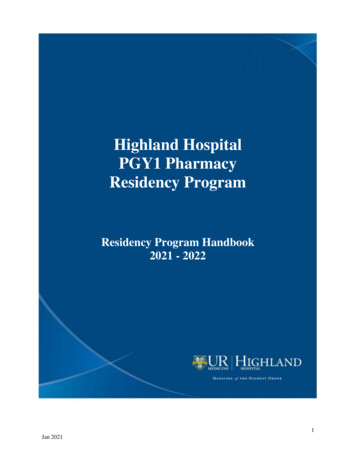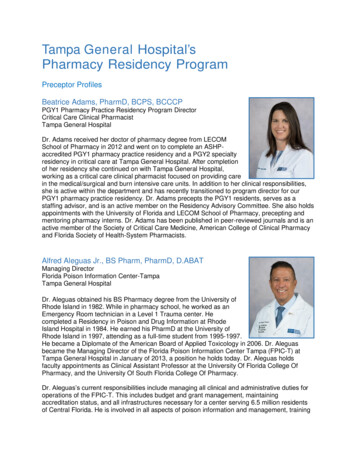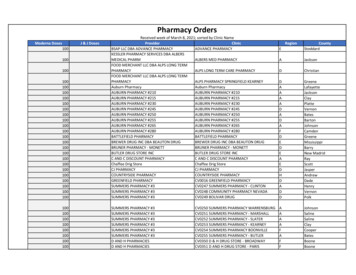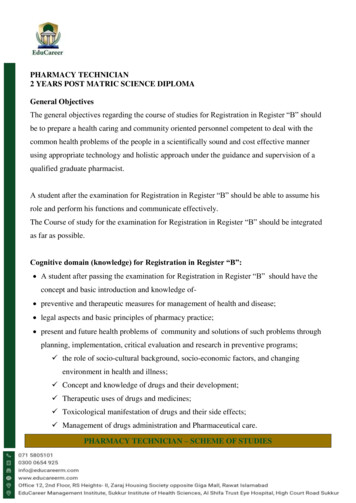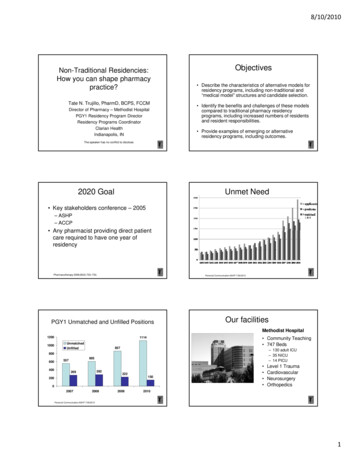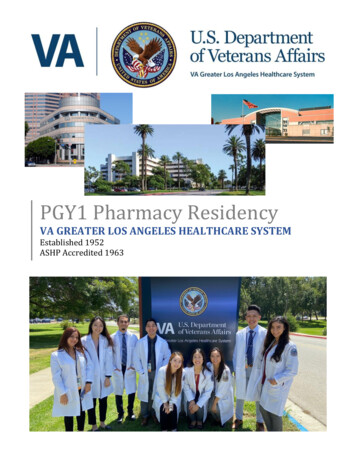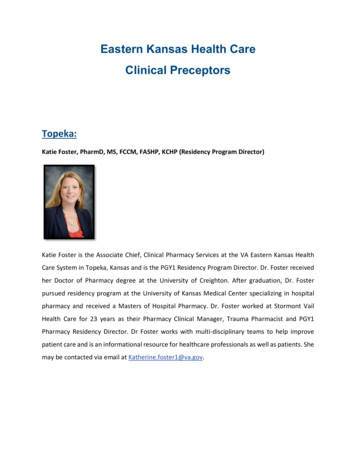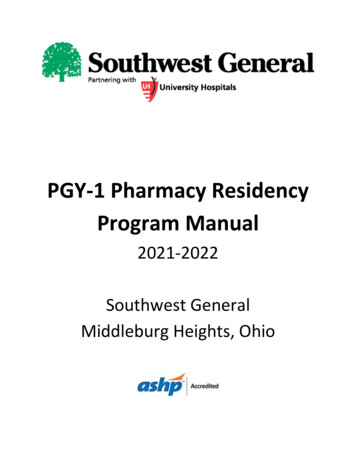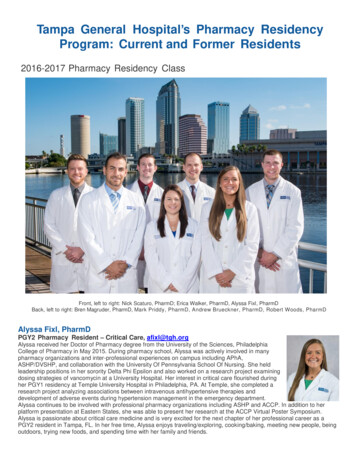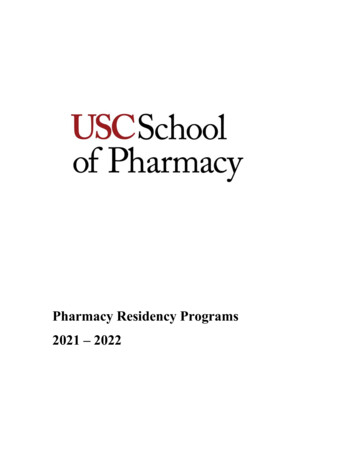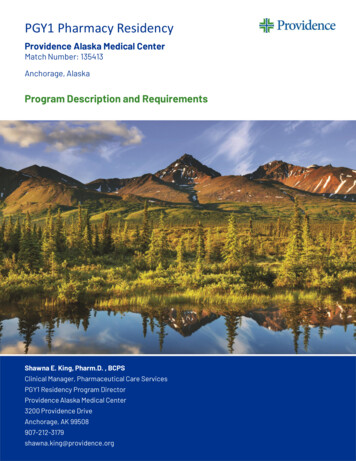
Transcription
PGY1 Pharmacy ResidencyProvidence Alaska Medical CenterMatch Number: 135413Anchorage, AlaskaProgram Description and RequirementsShawna E. King, Pharm.D. , BCPSClinical Manager, Pharmaceutical Care ServicesPGY1 Residency Program DirectorProvidence Alaska Medical Center3200 Providence DriveAnchorage, AK 99508907-212-3179shawna.king@providence.org
Pharmaceutical Care ServicesProvidence Alaska Medical Center (PAMC) in Anchorageconsists of 401 acute care beds and is part of theintegrated Providence health system across seven states.The Alaska region includes Providence Kodiak, Valdez, andSeward Medical Centers; Providence Extended Care andTransitional Care Centers; Family Practice, General Medicaland Senior Clinics; assisted living and drug abuserehabilitation facilities and Outpatient Infusion Center. Thehealth system supports a Family Practice PhysicianResidency program and provides training sites for theUniversity of Alaska at Anchorage Nursing and UAA/IdahoState University pharmacy programs. Major service linesinclude Medicine/Surgery, Oncology, Emergency,Neurology, Cardiovascular, Critical Care, BehavioralHealth, and the Children’s Hospital. Pharmacy services aresupported by an electronic medical record withprovider order entry and bedside barcoding. Formulary,clinical and operational systems and services areintegrated with the other Providence ministries.PAMC Pharmaceutical Care ServicesDepartmentThe Pharmaceutical Care Services Department employsover 70 FTEs of pharmacists, technicians and supportpersonnel with 24 hour per day services including: Centralized unit dose distribution, order verificationand IV Admixture service Decentralized Clinical Services including anAntimicrobial Stewardship Program ICU Satellite pharmacy and order verification Emergency Department Outpatient IV Infusion and Cancer Therapy CenterLearn about our pharmacy residency programs, e department is committed to providing andexpanding the pharmacy’s role in the delivery ofquality pharmaceutical care. This includes:Routine Focused Medication Use Review – Routine orderscreening and medication use trouble shooting, patientprofile review, dosing and monitoring of aminoglycosides,warfarin, digoxin, anticonvulsants, pain medications,parenteral nutrition, drugs in renal impairment, and othertarget drugs; antibiotic use review, adverse drug reactionmonitoring, therapeutic exchange program, medicationreconciliation, transition of care services. All vancomycindosing is done by pharmacistsInterdisciplinary Rounds – Family Practice, Hospitalist,Critical Care, Coronary Care, Pediatrics, Pediatric IntensiveCare, Neonatal Intensive Care, Oncology, Tumor BoardPatient Education – Warfarin, Chemotherapy, Cardiac andPulmonary Rehabilitation, ConsultsMedication Use Quality Improvement Activities –Medication Use Guidelines and Policy Development, DrugUse Evaluation and Benchmarking, Newsletters, CoreMeasure and National Patient Safety Goal Initiatives,Providence Quality InitiativesDrug Formulary Management – Providence Pharmacy andTherapeutics Committee class reviews and monographdevelopmentCode Attendance – Cardiac, Stroke and Sepsis AlertsInvestigational Drug Program in OncologyStaff Education – Staff Meetings, Weekly Clinical Meetings,Competency ProgramTeaching – Pharmacists, Pharmacy Interns, MedicalResidents, Medical Staff, Nurses, Public and PharmacyAssociation Presentations
Residency Program MissionResident EvaluationThe PGY1 Pharmacy Residency Program builds on theDoctor of Pharmacy (Pharm.D.) education and outcomes tocontribute to the development of clinical pharmacistsresponsible for medication related care of patients witha wide range of conditions, eligible for board certification,and eligible for post graduate year two (PGY2) pharmacyresidency training.Two-way verbal exchange regarding progress will occurregularly, at minimum weekly, during rotations. Formativeevaluation will occur during experiences and summative atthe end of each block learning experience or quarterlyfor longitudinal experiences. Residents will self-evaluateperiodically throughout the residency. Residents willevaluate preceptors and learning experiences formally atthe end of each learning experience.Program Goals and ObjectivesThe Providence Alaska Medical Center Residency Goals areas follows: Serve as an authoritative resource on the optimal useof medications used to treat a wide variety of medicalconditions. Optimize outcomes by providing evidence-based,patient-centered medication therapy as an integralpart of an interdisciplinary team.Compensation/BenefitsPGY1: 52,050 per yearBenefits will begin on the first day of employment andinclude: Medical Dental Vision Demonstrate competency in medication order reviewand central pharmacy operations. Long Term Disability Company-Paid Basic Life Insurance Supervise and coordinate pharmacy technical staff. Work independently in various pharmacy serviceareas.Supplemental Life Insurance for employee, spouse,and/or children Supplemental Accidental Death & dismemberment Dependent Life and Accidental Death& Dismemberment Insurance for spouseand/or children Healthcare Reimbursement Dependent Care FSA (for work-related child- or eldercare expenses 403B retirement Program Meeting support for ASHP Midyear and NorthwesternStates Residency Conference Contribute to improvement of medication use,medication use systems and pharmacy services. Demonstrate excellence in the training and educationof health care professionals. Sustain ongoing personal development of expertiseand professionalism in pharmacy practice.The resident will demonstrate competencies in four coreareas: Patient Care Advancing Practice and Improving Patient Care Leadership and Management Teaching, Education and Dissemination of KnowledgeLearn about our pharmacy residency programs, sidents have 10 work-days of vacation time, 11professional leave days, and 8 sick days available to them.Residents work 1 major holiday and 2 minor holidays withothers off.
Learning Experience DescriptionsPediatrics (REQUIRED)Orientation (REQUIRED)Preceptors: Nicole Phillips, Pharm.D., BCPPS, CarrieStanfield, Pharm.D.Preceptors: Shawna King, Pharm.D., BCPSResidents are introduced to and perform a variety ofactivities within the PAMC Inpatient Pharmacy and MedicalCenter. General orientation occurs over the first fourweeks of the residency and consists of all aspects of newPharmacist orientation. Three additional weeks are spentin the Central Pharmacy and critical care satellite learningmedication safety, order verification, medicationdispensing and checking operations technology,communication systems and processes. Weekend clinicalorientation includes several weekends training onMedicine/Surgery and PCU services. Decentralized Clinicalpreceptors vary depending on service area.Pediatrics is an experience in the General Pediatric andPediatric Intensive Care units serving patients from oneweek of age through adolescence. Residents round withthe Intensivist and Pediatric Practice Teams.Infectious Disease (REQUIRED and ELECTIVE)Preceptor: Nick Smith, Pharm.D., BCPS, Ben Westley, M.D.The resident rounds with the antimicrobial stewardshippharmacist and an infectious disease physician. Review ofdrug therapy, recommendations to physicians, andpharmacokinetic and drug information consultations arecomponents.Internal Medicine/Surgery (REQUIRED)Emergency Department (REQUIRED and ELECTIVE)Preceptors: Mariah Cadavos, Pharm.D., BCPS, Ballard Saul,Pharm.D., BCPSPreceptors: Dominique Lauten, Pharm.D., BCPS, StuartBurke, Pharm.D., Vivian Nguyen, Pharm.D.The resident rounds with the Hospitalists and servesgeneral surgery patients on the hospitalist service.The resident provides pharmaceutical care to selectedpatients admitted to the Emergency Department and thoseawaiting hospital admission. The resident also workswith medication history technicians in transition of careactivities and attends codes and traumas in the emergencyroom.Family Practice (REQUIRED)Preceptors: Ballard Saul, Pharm.D., BCPS, Mariah Cadavos,Pharm.D., BCPS, Amy Paul, Pharm.D., BCACPThe resident rounds with the Family Practice MedicalResident Team and provides pharmaceutical care to thesepatients.Ambulatory Care (REQUIRED and ELECTIVE)Progressive Care (REQUIRED)During this rotation the resident works with pharmacistswho are license providers at Providence Medical GroupAlaska and Providence Family Medicine Clinic. Residentwill practice in the Patient Centered Medical Home Modeland manage a variety of chronic disease states in theambulatory care setting.Preceptors: Leah Twohy, Pharm.D.An experience on the Progressive Care Unit withcardiovascular, intermediate care, nephrology, andneurology components.Critical Care (REQUIRED and ELECTIVE)Preceptors: Roberto Iaderosa, Pharm.D., BCPS, BCCCP,Allorie Caldwell, Pharm.D., BCCCPCritical Care is an experience with pharmacists coveringthe Adult Intensive Care Units. Rounding occurs daily withthe Intensivists. The resident will respond to Codes duringthe rotation. Completion of ACLS is a prerequisite.Learn about our pharmacy residency programs, eceptors: Amy Paul, Pharm.D., BCACP, EmilyThomas, Pharm.D., BCPS
Operational and Clinical Staffing (REQUIRED,Longitudinal)Central Pharmacy Preceptors: Brian Malecek, Pharm.D.The longitudinal learning experience encompasses Centraland Decentralized Clinical Pharmacy services. The residentis scheduled in the Central Pharmacy for four weeks oftraining at the beginning of the residency year.Approximately every other weekend the resident providesservices independently rotating in the following areas:Central Pharmacy, Medicine/Surgery or Progressive CareUnit.Teaching Certificate (REQUIRED, Longitudinal)The University of Connecticut School of Pharmacy ACPEaccredited Teaching and Learning modules are used forthe teaching certification. In the comprehensive 23 CPEcredit activity (additional 3.5 hours optional) residents willlearn the concepts of teaching and learning as it relates toclassroom, discussion group, and experiential learning. APractice-based Certificate of Achievement will be awardedto those who complete all 4 modules.Pharmacy Practice Management, Teaching, andLeadership (REQUIRED, Longitudinal)Preceptors: Shawna King, Pharm.D., BCPSDuring this longitudinal experience objectiveswill be completed through weekly staff andclinical meetings, assignment of residentprojects, participation in interdisciplinary activities, P&Tcommittee meetings, group discussions and teachingactivities including didactic lectures and precepting.Residency Project (REQUIRED, Longitudinal)The residents work with a preceptor to identify aproject, develop and submit a protocol to the IRB, collectand analyze data, develop and present a poster, developand present a platform presentation, and draft amanuscript.Learn about our pharmacy residency programs, formatics and Technology (ELECTIVE)Preceptor: James Fischer, Pharm.D.An elective rotation with an informatics pharmacistworking on projects related to the electronic medicalrecord and technology implementation and optimization.Oncology (ELECTIVE)Preceptors: Katie Kammers, Pharm.D., BCPS, BCOP, TarahHibbs, Pharm.D., BCOPAn elective rotation during which the resident isresponsible for providing comprehensive pharmacyservices to oncology patients, both adult and pediatric.Neonatology (ELECTIVE)Preceptors: Nicole Phillips, Pharm.D., BCPPS, CarrieStanfield, Pharm.D.Neonatology is an elective in the Neonatal Intensive CareUnit. Interdisciplinary rounds are attended daily.Pharmacists manage neonatal abstinence syndrome andantibiotic therapy among the pharmaceutical care servicesprovided.Pharmacy Operational and Clinical Management(ELECTIVE)Preceptors: Shawna King, Pharm.D., BCPS, KarenThompson, Pharm.D., BCSCPA four-week elective experience working with the clinicalmanager and/or the operations Manager and theMedication Safety Officer/IV Additive Service Supervisorparticipating in clinical or operational managementactivities.Staffing ResponsibilitiesIn order for the resident to adequately gainthe understanding and confidence necessary toprovide pharmaceutical care, it is necessary thatthe resident spend some time staffing. This consistsof approximately every other weekend in clinicalor operational areas and independently managingeach service at the end of required learning experiences. Aresident should be competent to staff independently inclinical areas by October 1 and in Central Pharmacy byOctober 31.
FAQSWhat is special about your program?What are the licensure requirements?Providence Alaska Medical Center (PAMC) is the largest(401 beds), most advanced medical facility in the stateserving patients statewide. It has Level II Trauma andPrimary Stroke Center Certifications, extensive oncologyservices and the only dedicated Children’s Hospital andLevel III Neonatal Intensive Care Unit in Alaska. Theseresult in a diverse patient population and an opportunity tohelp provide care to patients presenting with a wide arrayof medical conditions, including cardiac surgery.An Alaska intern license is required by the first day oforientation The resident must become licensed asa pharmacist in the state of Alaska by August 31.PAMC is a not-for-profit community hospital supporting aFamily Practice Medical Residency program. As a PGY1pharmacy resident, you will round with the inpatientmedical resident team, making medicationrecommendations and adjusting therapy.Attending physicians and residents look forward to thetime of year the pharmacy residents rotate with them. Youalso round with an interdisciplinary team on medicine,pediatrics, infectious disease, adult critical care,coronary care and in NICU, if it is chosen as anelective. PAMC also supports the Universityof Alaska/Idaho State University (UAA/IDSU) School ofPharmacy by offering student rotations. Our electronicmedical record and physician order entry make our clinicalwork very efficient. We have all patient information at ourfingertips whether in patient care areas or in the centralpharmacy.What are the strengths of your program?Our biggest strength is the people we work with. Thepharmacy department is highly respected and appreciatedby other disciplines, including nurses andphysicians. Clinical pharmacists have dedicated time andworkspace on inpatient units and are integrated inpatience care activities. Preceptors are excellentclinicians and have a passion for teaching.The residency director and preceptors have a high level ofcommitment to the residents. Pharmacy residents spendmost of their rotations with well-establishedclinical pharmacists who have close working relationshipswith the medical staff and a wealth of experience to share.Residents leave the program with the skills to becomeexcellent practitioners. We have traditionally hired many ofour residents after completion of the program.Learn about our pharmacy residency programs, w customizable is your program?Each resident must complete orientation and the followingrequired 4-week learning experiences:Pediatrics, Medicine/Surgery, Family Practice, AdultCritical Care, Ambulatory Care, Progressive Care,Infectious Disease, Emergency Department, and ClinicalStaff Training. Residents also have longitudinalexperiences including Pharmacy Practice Management,Teaching, and Leadership and Residency Project.Two elective rotations are chosen by the resident from thefollowing: Neonatal Intensive Care, Oncology, Clinical orOperational Management, Critical Care, Ambulatory Care,Infectious Diseases, Emergency Department, andPharmacy Informatics and Technology.The resident has some flexibility as to when a final decisionis made on their electives. We know that as you experiencethe different areas of clinical pharmacy, your interests maychange along the way. Our program is designed to give youa good foundation in major areas of clinical pharmacyand the resources for you to explore your interests.If you are interested in doing a PGY2 specialty residency,we attempt to schedule a related rotation prior to theASHP Midyear Clinical Meeting, if possible. The annualresident project may be done in that area of interest ifthere is an organizational need. The PGY2 OncologyResidency Program accepts early commitmentapplications (deadline November 1) and decisions are madeby November 7.
What is a typical day like during your residency?Residents act as decentralized clinical pharmacists onmost days. They are responsible for complete patientprofile reviews, managing consults, transition of careservices and managing clinical issues that arise. Mostrotations also have interdisciplinary rounds attended bypharmacy. Residents meet with their preceptor on a dailybasis to discuss patients and pertinent drug or diseasestate topics. Time during the week is also spent educatingpatients and students, attending departmental andinterdisciplinary meetings, completing journal clubs, casepresentations, departmental projects and a residencyproject.Are there opportunities to teach and preceptstudents?Our department hosts many pharmacy students on learningexperiences and high school students interested in theprofession. Residents are expected to assist withprecepting students while on rotation together.There are also opportunities throughout the year to provideeducation to pharmacy, nursing, medical and other hospitalstaff. The University of Alaska Anchorage campus locatedadjacent to the hospital has a large nursing program, and aPharmacy School jointly with Idaho State University,offering the potential for teaching. There areopportunities to give didactic lectures to larger audiencesin addition to educating small groups. An ACPE-accreditedpresentation at the Alaska Pharmacists Association AnnualMeeting is required. Residents also teach pharmacist staffthrough case presentations and journal clubs, and teachpatients in the outpatient Pulmonary and Cardiac Rehabclasses.What are you looking for in a resident?The resident should expect a very demanding program withmultiple simultaneous responsibilities. We seek candidateswith a burning desire for learning, a willingness to putin many hours outside a normal work week and good stress/time management skills. An ability to communicate openlywith maturity and emotional intelligence is very important.We seek candidates who demonstrate an interestin improving the plight of the patient by promotingthe profession, the role of pharmacy, and effectiveness ofour services to that end. Previous involvement in clinicalprojects and extracurricular activities demonstrate thatdesire.Learn about our pharmacy residency programs, r residents are expected to become competent in thecentral pharmacy and clinical areas quickly, so an excellentclinical foundation (some acute care rotations completed)and previous work in a hospital pharmacy areadvantageous. A Pharmacy School GPA cut-off of 3.0is used in our initial screening of applicants.During the presentation done at the interview we look forthe applicant’s ability to create good visual aids and topresent clinical information articulately, including analysisof pertinent literature.And finally, we are looking for residents who will work inpartnership with our staff, find humor in their day and lovewhat they are doing.About AlaskaThe scenic beauty of Alaska is second to none. Incrediblemountain views and frequent wildlife sightings are just afew of the perks of living in Anchorage.There are numerous opportunities for outdoor enthusiastsin or within a short drive of the nation’s northernmost majorcity.The most popular activities include hiking, fishing, camping,skiing and biking. There are over two hundred miles of trailsin the City of Anchorage to bike or ski.Anchorage has ample cultural events, a symphony, theaterproductions, multiple museums and art galleries.There are a wide variety of excellent locally ownedrestaurants and farmers’ markets during summer months.Many of our staff members are good friends and spend timetogether outside of work. Activities often include hiking,skiing, pub trivia, going to the movies, having dinner,brewing beer, fishing and hunting, walking pets, going to thetheater or symphony, working out and traveling together.Many of the staff members are not originally from Alaska, sothey often spend holiday celebrations together too.
Application RequirementsContact InformationTo be eligible for a Providence Alaska MedicalCenter Pharmacy Residency, applicants must submit thefollowing via PhORCAS:Please feel free to contact us if you have any questionsabout our program. Thank you for your interest and welook forward to hearing from you. A letter stating why you are interested in doing aresidency at Providence Alaska Medical Center Curriculum VitaeClinical Manager, Pharmaceutical Care Services Transcript (pharmacy)PGY1 Residency Program Director Three references via the Standardized ReferenceForm Available in PhORCAS. If you have worked in ahospital and/or or community pharmacy, pleaseinclude a minimum of one reference from eachsupervisor at those institutions. Also include at leastone reference from an acute care clinicalrotation preceptor.Providence Alaska Medical CenterApplication deadline: December 28We participate in the ASHP matching program. The ASHPwebsite has information regarding the process(www.ashp.com). Our Residency Matching Program Codenumber is: 135413If you are invited for an interview, a brief presentation (20minutes plus 10 minutes of Q&A) on a subject of your choiceis required during your interview.Shawna E. King, Pharm.D., BCPS3200 Providence DriveAnchorage, AK 99508907-212-3179shawna.king@providence.org
PGY1 Pharmacy Residency Providence Alaska Medical Center Match Number: 135413 Anchorage, Alaska . Health, and the Children's Hospital. Pharmacy services are . general surgery patients on the hospitalist service. Family Practice (REQUIRED) Preceptors: Ballard Saul, Pharm.D., BCPS, Mariah Cadavos, .
